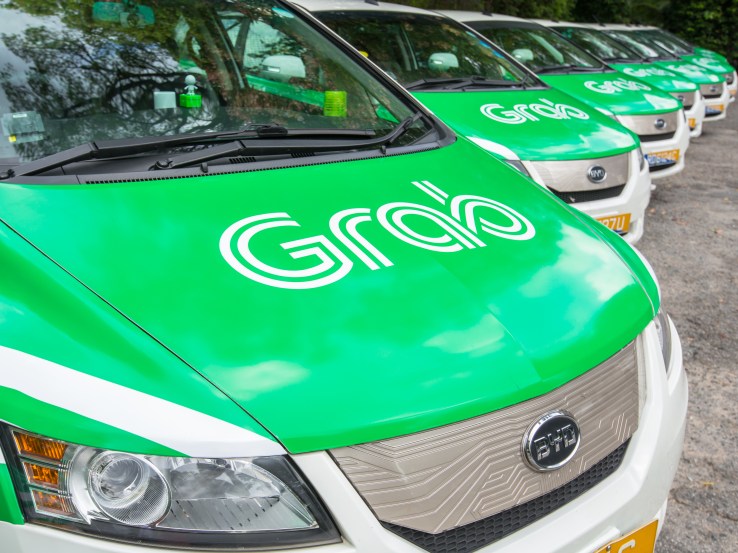Grab gets $2B from Didi and SoftBank to fuel bid to defeat Uber in Southeast Asia

Grab, the ride-hailing company competing with Uber in Southeast Asia, has pulled in $2 billion of new financing from existing investors Didi Chuxing, the company that defeated Uber in China, and SoftBank.
Didi said the round could expand by $500 million more with input from other existing backers and new investors, too. A Grab representative confirmed that SoftBank’s Vision fund is not part of the current commitment, it is coming from SoftBank Group Corp.
A source confirmed that this new money gives Grab a post-money valuation of more than $6 billion. That’s more than double the $3 billion valuation that Grab commanded from its most recent round of funding in September 2016, when it raised $750 million.
“We are delighted to deepen our strategic partnership with DiDi and SoftBank. We’re encouraged that these two visionary companies share our optimism for the future of Southeast Asia and its on-demand transportation and payments markets, and recognize that Grab is ideally positioned to capitalize on the massive market opportunities,” said Anthony Tan, group CEO and co-founder of Grab.
Essentially, both Didi and SoftBank are doubling down on the belief that Grab has what it takes to defeat Uber in Southeast Asia, the same way that Didi did in China when Uber agreed to sell its local business last August. That hope of defeating the U.S. firm was reignited this month when Uber agreed to sell its business in Russia to local rival Yandex.
“Starting with transport, Grab is establishing a clear leadership in Southeast Asia’s internet economy based on its market position, superior technology, and truly local insight,” Cheng Wei, founder and CEO of Didi, added via a statement that is fairly damning of Uber. (Didi is an investor in Uber by virtue of the China acquisition deal.)
Grab operates in 36 cities across seven countries in Southeast Asia, where it claims over 50 million downloads from users and 1.1 million drivers on its platform. Its services are primarily focused on licensed taxis and private cars, but Grab also offers motorbike taxis, shuttle bus services and carpooling in a selection of countries.
Uber doesn’t reveal public data for its Southeast Asia-based business. But one rival that is upsetting Grab is Go-Jek, a bike and car on-demand platform in Indonesia that is seen widely as the market leader in the country.
On a business-level, Uber began to see profitability in selected markets in Southeast Asia last summer, sources told us at the time, but it increased its investment in the market (and India) following its exit from China, which then-CEO Travis Kalanick revealed was costing the firm $1 billion a year. A Grab spokesperson said the company is profitable “in certain verticals and cities, but we don’t break that down.” Grab did share the results of a study it commissioned which found it owns 95 percent marketshare of licensed taxi e-hailing and 71 percent of private cars across Southeast Asia.
In a bid to take its business to the next level, Grab is also developing a mobile payments platform. That began as a mechanism to accept payment via credit cards, having started out as cash-only, but that focus has also seen Grab develop a fintech push in Indonesia, Southeast Asia’s largest economy and the world’s fourth most populous country.
Indonesia is tipped to account for more than half of the revenue of ride-sharing services across the region by 2025, with the overall industry forecast to $13.1 billion that year up from $2.5 billion in 2015, according to a report co-authored by Google last year. Grab sees a lot of that potential stuck behind the country’s outdated banking system, and it is working on financial inclusion systems to help grow the consumer pie that it serves.
At the start of 2017, Grab announced a $700 million investment program to build its services in Indonesia, of which at least $100 million is dedicated to investments and acquisitions. It didn’t take long to dip into that, with Grab buying offline payment startup Kudo two months later in a deal sources told TechCrunch could be worth as much as $100 million over time.
The fintech play is a move to battle Go-Jek, which began offering payment services before Grab dipped its toes into the market. Sources close to Go-Jek told TechCrunch that the company raised $1.2 billion led by Tencent in May, although it did not confirm that at the time and hasn’t announced the raise. This new capital raise from Grab immediately puts pressure on Go-Jek’s own financial position.
Featured Image: Grab